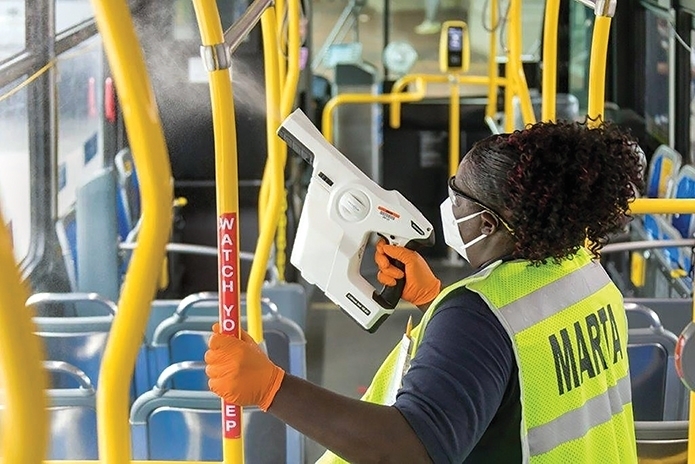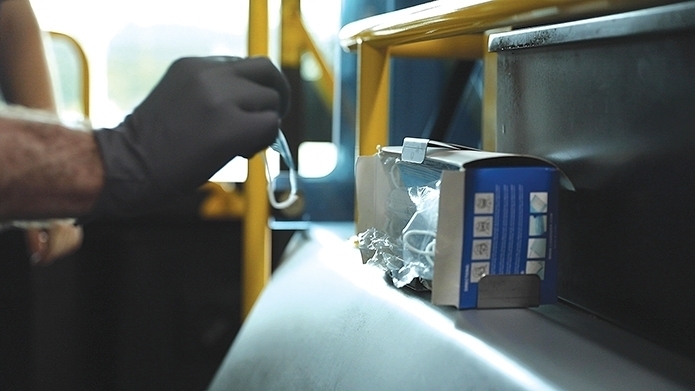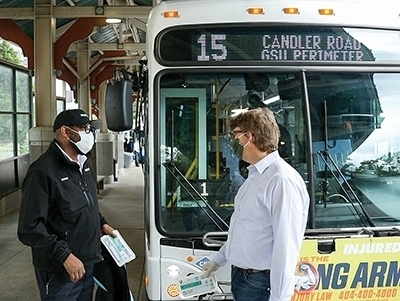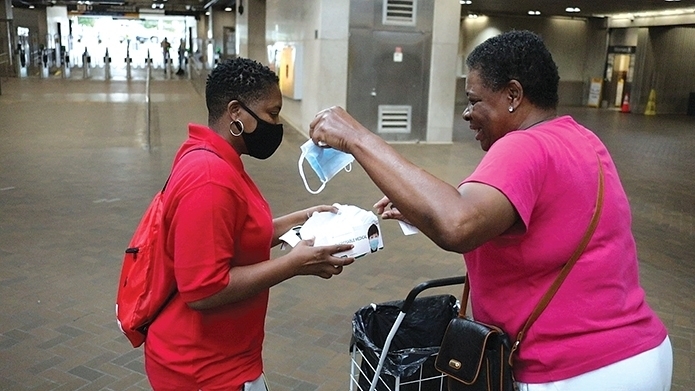
By Emma Green
Through the onset of a global pandemic, Atlanta demonstrates how an international crisis is the perfect opportunity to reinvent and deliver the best possible service to its ridership

Since opening in 1979, the Metropolitan Atlanta Rapid Transit Authority (MARTA) has provided service to millions of metro Atlanta residents and made billions of trips carrying passengers by bus and rail. MARTA’s rail service includes over 338 rail cars and carries passengers to 38 stations throughout the metropolitan area. Over 550 buses provide service along 1,659 miles of road on 110 routes.
Since March, MARTA has experienced a dramatic decrease in ridership, with rail dropping to 30 percent of its pre-COVID riders and bus dipping to 60 percent.
“We simply started with this phone call at 7 p.m. every night,” said MARTA General Manager and CEO Jeffery Parker, describing how the senior leadership pulled together. “We were just trying to figure out what was going on and what was going to be next.”
MARTA quickly made the decision to significantly shift their bus resources, limiting service to 41 central bus routes (down from 110) in an effort to ensure that social distancing could safely remain in effect.
With only 35 percent of their riders wearing masks, MARTA implemented a simple solution. Station employees began handing out masks at rail stations and bus bays and mask dispensers were installed on every bus.
“Our goal from the onset of the pandemic has been to protect the health of our customers and employees,” Parker said. “Requiring masks and making them readily available was the solution that made the most sense.”
The result is that over 90 percent of bus and train passengers are now wearing masks.
After hearing about Delta Airlines stringent cleaning and sanitization practices, MARTA contacted the company.

“I called someone I knew there, and we connected them with our maintenance staff and some of our transportation staff,” Parker said. “This was back in April, when you couldn’t even get hand sanitizer.”
The airline was flying a plane overseas to collect resources including industrial foggers that would allow for extensive disinfection of large interior areas such as buses and trains. This type of equipment could save valuable time and resources while more effectively protecting passengers. Delta added 40 foggers to their shipment and MARTA was able to quickly put them to use.
 Throughout the pandemic, MARTA has continued to prioritize customer experience on their vehicles and in their stations. As one of the fastest growing metropolitan areas in the country, Atlanta has several initiatives to expand public transportation.
Throughout the pandemic, MARTA has continued to prioritize customer experience on their vehicles and in their stations. As one of the fastest growing metropolitan areas in the country, Atlanta has several initiatives to expand public transportation.
While still in the planning phase, MARTA is quickly moving into the construction of a several billion-dollar program to expand transit within the city of Atlanta, focusing on the city’s first BRT route. MARTA is also working to expand light rail to the BeltLine and bring on its first electric buses.
Since 2016, MARTA has partnered with Soccer in the Streets, a not-for-profit organization dedicated to sports-based youth development through better access to quality soccer programs. The initiative builds soccer fields and community classrooms in and around MARTA rail stations. Parker is confident these pitches and a MARTA-based soccer league will bring communities together.
“We think of our transit systems as a bunch of lines, but the dots are the stations and how they connect with the communities they serve is so important,” Parker said. “Station Soccer, our Fresh MARTA Markets that provide fresh produce to neighborhoods in food deserts, and our public art program Artbound, are all ways in which we connect with communities.”
One of MARTA’s most significant new initiatives is a partnership with HOPE Atlanta, a nonprofit organization offering housing, social services, substance abuse counseling and employment services to homeless people in the metro area.
“We recognized, as every transit agency has, the unsheltered and homeless population becoming more pervasive on our system and decided we needed to shift our approach,” Parker said. “Being homeless is not a crime. We need to be part of the solution in a more meaningful way.”

Working with homeless advocacy groups and jurisdictional partners, including the City of Atlanta, MARTA has incorporated a community-based approach focusing on the deployment of two social workers partnered with two protective specialists through the implementation of a one-year pilot program. The objective is to connect with Atlanta’s unsheltered populations, better understand their needs and ultimately find them access to temporary or permanent housing.
Parker credits MARTA’s historically conservative approach to finances with the transit organization’s ability to maintain impactful services during the crisis.
“We’re focusing on putting together a strong program management approach to delivering these big capital programs and maintaining our infrastructure,” he said. “So that we can do that efficiently and stay on time and on budget with our projects.”
MARTA received $299 million in CARES Act funding, keeping the agency fiscally solvent through 2024.
Parker said the agency is working hard to focus on rightsizing, becoming more efficient on the administrative side, and maintaining relevant and necessary services for its customers.
“There have been many challenges over the last six months and the long-term effect of the pandemic on transit is still unknown, but I am proud that we have been able to provide safe, essential transit without any layoffs, fare increases, or permanent service cuts, while implementing safety measures to ensure the health and well-being of our customers and employees.”
